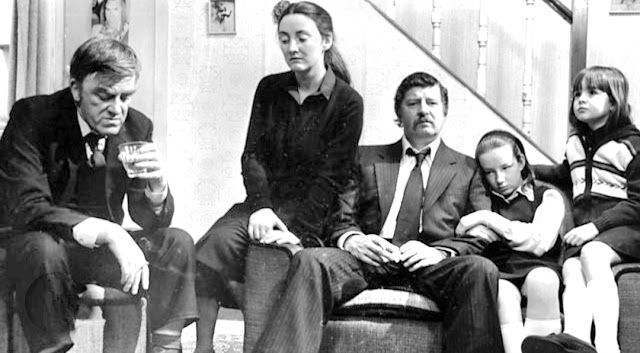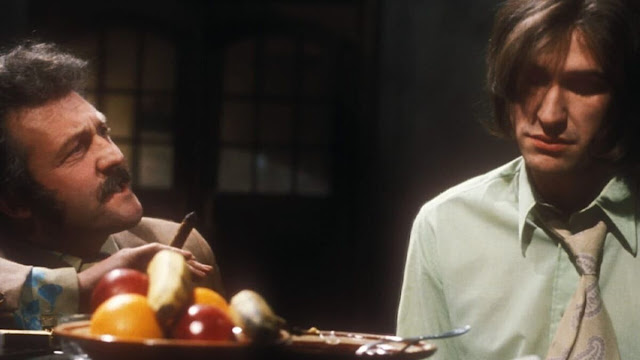The Lie
The Lie, I discovered after watching it, was originally broadcast in Swedish, so that the Play for Today version was a translated work rather than, as I imagined, something commissioned from Ingmar Bergman especially for Play for Today. That explains why nothing about it seemed English - not the architecture, nor the settings, nor the clothes. Possibly not even the way the characters behaved - although I think it would be unfair to the people of Sweden to imagine they all live their lives along the lines of what one was shown in this play.
The action opens on a shot of a one-story house, built around the 1960s I would guess. Conveniently for the cameraman the people inside the house sleep with their curtains open so we are able to peer through the windows to meet the main characters, each in their bed in their separate bedrooms. The husband gets up and does a few cursory physical jerks, the wife lies under the covers and expertly fends off her rather sweet little boy, who comes in to tell her he's been coughing all night.
The family has a live in woman housekeeper, which left me puzzled. There was Mrs Bird in the Paddington books, but no one I knew ever had a live-in woman, older than themselves, sharing a rather small house. In my experience, there were families with feckless au-pairs who didn't manage everything efficiently, as this woman clearly was doing - including the child care - or there were families who lived in big houses in the country with staff and a nanny. No-one fitted the arrangement we are shown in the film - but then no one in England had a house like the one in The Lie, or the furniture within it.
Anyway, the husband, once dressed, has a conversation with his wife, who is reading her letters, (yes, letters, made of paper, imagine), still sitting in bed, having been served her breakfast there by the housekeeper. They have a fairly businesslike conversation and he then sets off to work.
His offices are modern and light and charmless in what I now realise is a Scandinavian way. He is, I think, an engineer. He gets called in by a higher-up to be told that his proposal for a project he has spent a lot of time on - and was scheduled to spend a lot more time on - has been rejected. This is clearly discomfiting although he does his best to remain calm. He senses he is about to be outflanked by younger colleagues, especially when his boss observes in response to his comment that he is only 40, "To be 40 is like having an unmentionable disease."
Meanwhile, the wife goes to visit her brother who is in hospital. He turns out to be wearing women's make-up and to have some kind of Jesus complex. She then goes to what looks like some sort of school, which we realise is her place of work - although it isn't clear what she does. She greets a woman with short hair and they discuss the grant that the wife has won. The short-haired woman confronts the wife, telling her, essentially, that she doesn't like her and that she thinks she is lying about something. This woman also bears her teeth to show a missing molar which, she explains with a crazed intensity, she is too apathetic to repair.
The wife then goes to meet her lover in a little flat they have shared for eight years. They spend quite a lot of time drinking tea and eating biscuits. A small amount of time is then devoted to going to bed together.
The husband meanwhile has a mild disagreement with his secretary and then apologises. He also goes to the works canteen where he has an awkward lunch with younger colleagues who may or may not already be aware of his failure to win approval for the work he has been doing. The canteen looks out on some sort of indoor gymnasium where people can be seen jumping on trampolines among other things.
The husband leaves the lunch abruptly and later drops in on a friend who is a doctor. The doctor is absent and so the husband stares at a tank of goldfish in his friend's waiting room and talks to the surgery nurse. He says he has realised that there is virtually no true intimacy between him and his wife or between the two of them and their children. He is clearly feeling very unhappy and isolated.
The wife arrives home late to meet her father who has come over for the evening. He is very unhappy and they have an uneasy conversation.
The husband in the meantime has been trying to contact his wife, but always without success.
We then switch to a dinner party attended by the husband and the wife and the wife's lover and his wife, plus numerous other people. Once again the decor is very un-English. These are wealthy people but there is no sign of anything antique, which is possibly one of the things I found disturbing about the film - we never see a trace of an old building or anything else from the past. In addition, the conversations are very un-English, (or un-my-experience-of-English). For instance, one character, walking in from the terrace to the table, observes to his female companion, "He began looking into the archetypal symbolisms in our scientific concepts. His view was that parallel to our objectives in the material world, we should look into the inner sources of our scientific concepts." Perhaps I've been living a very sheltered life, but this seems quite an unusual line of conversation to me.
At the dinner table, the husband sits next to the lover's wife and looks down the table at his own wife and speaks admiringly of her. Meanwhile his wife is next to her lover and they are having a coded conversation.
At the end of the evening, at home, the husband and wife make love in the wife's room. The husband then goes to his own room but returns later and admits that he was unfaithful that afternoon with the nurse he met at his friend's surgery. The wife eventually admits that she has been involved with her lover for eight years. Fury ensues, including a scene that may have inspired the axe and door scene in The Shining. It is all very unpleasant and then the film ends.
When it did end, I thought how right I had been when I started to watch the film and, for some reason I couldn't explain to myself at the time, took every opportunity I could to interrupt my viewing. There was something repellent about the characters and the setting and the story. I still can't shake off that feeling. The acting was good, the whole thing was peculiarly gripping, but the iciness of the whole upset me.
I should point out what I didn't realise until reading the credits at the end - the husband is played by a very young Frank Finlay. He did a good job. Additionally, I've just discovered the mad brother was none other than Joss Ackland, recently dead, and who has always maintained a special place in my memory after I, ghaving being taken by my mother to see a terrible Christmas musical called Jorrocks, in which he starred expressed wild enthusiasm for the production in order not to hurt my mother's feelings and asa a result received from her the LP of the show as my Christmas present. On opening it, I once more pretended wild enthusiasm. Luckily there was no further merchandise she could supply after that.
Anyway, The Lie made my skin crawl. Perhaps it was meant to, in which case I can only say it was an absolutely stunning success. It also, I now discover, won a prize and, perhaps as a result, the BBC inflicted it on its long-suffering audience twice more - having first broadcast it in October, 1970, they chose March, of all miserable months, to rebroadcast it, first in 1971 and then again in 1972. If you told me the suicide rate increased following the repeats, I wouldn't be surprised. I should mention to that an American version was also made, which might be more fun. Or not




Comments
Post a Comment